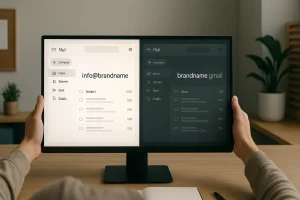
Brands With a Custom Email Domain Present More Credibility
Let’s set one thing straight from the start: customers have never been more attentive to the little details that make their interaction with a brand.
Or more sceptical – more determined to end engagement if they sense something’s off. And the nature of a reaction can be triggered by the very first letter of the email.
Say a shopper expects an email from Sephora – they’re highly unlikely to get fooled by an attack attempt from an email that looks like “Ssephora”. A
nd while it’s mostly part of their job to ensure they’re not engaging with dubious operators, whether they give away valuable data, make payments, or access sketchy URLs, your business has its share of responsibility, at least if you want to boost its credibility.
In a world where AI is forecast to make phishing attacks 95% cheaper – thus, more appealing – your business must secure its hard-earned edge.
You need to make your email outstanding and professional, and with the right email provider, you can even leverage additional perks like multiple email management, built-in calendars, admin panels, spam filters, and systems that ensure your emails always reach their destination.
Why a Custom Email Domain?

A customer’s first impression of a brand often begins long before they access its website, it’s in the moment they see the small line of text hinting at what’s behind the message.
A custom email thus isn’t a mere, technical addition; it becomes a powerful statement. It shows intention, structure, and credibility. When one receives a message from an address like “company@brandname.com”, their first instinct is to think that the sender is real.
Compared to something like “companyname@gmail.com”, which lacks authenticity and intent, it’s easy to see how the entire tone shifts. One is deliberate; the other is there just to be.
Trust has become a form of currency in the online space, where cyber threats like bots are prevalent on every platform.
Customers have thus become more alert than ever to who’s reaching out to them, paying closer attention to what companies’ email addresses evoke. It’s steadily built caution.
A brand domain conveys authority, indicating that the entity is invested in its identity and security. It reflects some sort of maturity and awareness that businesses like yours can’t afford to miss.
For all the obvious reasons, your customers need to know they can trust the business they’re engaging with more than ever.
This is just one reason why having a custom email domain is the first step when thinking about how your address feels to recipients.
Setting up a custom email domain assures your customers that they can trust whoever’s behind the outreach message.
It’s a small step that reinforces your professional image and helps you stand out in the most crowded of inboxes.
Deliverability and Visibility
There’s a practical advantage to custom emails, one that goes beyond appearance. Big email providers like Microsoft, Yahoo, and Google rely heavily on authentication to determine which email makes it into users’ inboxes these days.
Custom domains allow email owners to set up standards like DMARC, DKIM, and SPF – tech acronyms that practically determine whether you’re who you say you are.
Free addresses, on the other hand, lack this heightened level of control. Without authentication, messages can easily end up in the spam folder or worse, get blocked. The difference is therefore seen in performance data.
Engagement rates like clicks, opens, replies, can make or break the sender’s reputation. Consistent branding and authentication reduce spam placement risk, positively influencing deliverability.
And you want to stay away from spam complaints, especially since anything above 0.3% can land you on the black list. It’s a sensitive situation, but the right email provider should be able to help you nail it down.
Brand Identity and Customer Trust
Everything in connection with a brand’s digital presence adds up to the bigger picture of how customers perceive the brand, from the website to the tone to the design – and yes, the email address ranks high in importance, too.
When everything matches and feels coherent and intentional, customers feel a natural connection that just makes sense, reducing friction.
People don’t have to do background checks or wonder if the message is really from that business – in this case, your business.
In an era where phishing emails replicate well-known brands in such flawless ways, a legitimate domain name’s reassurance is powerful.
A custom domain also helps refine the brand’s identity internally, giving messages more structure.
A startup might begin with a free email simply for convenience, but when it takes off and transitions to a branded domain, something shifts. It’s a visible sign of taking things seriously, of prioritizing professionalism – of being more than an entry project.
Customers often feel that, often subconsciously, which explains why so many growing companies make this move as one of the most important undertakings toward scaling.
Trust Mirrors Engagement

Trust is the invisible maker of engagement, with people being way more likely to interact with emails from brands they trust.
The sender that feels suspect, ambiguous, or strange (say a free email that doesn’t resonate with the brand) is destined to end up on black or spam lists.
Phishing keeps topping the list of cyberthreats, and researchers found that certain demographics, prior training, and the email’s design and typology significantly affect whether people click on phishing emails.
Brands with authenticated, custom domains boost inbox placement rates, and when you master this art, you can rest assured knowing that the bulk of people your emails target actually see your message. And when they trust the sender, they don’t just see it, but act on it.
Credibility is a must, which is what custom emails are targeting and gaining.
For many companies, shifting from the traditional and convenient free email address marks a quiet, but meaningful turning point.
It’s not just a branding decision, it’s an action in direct connection with buyer trust. A security and growth decision.
Because in 2025, and clearly beyond, you can’t win trust with flashy campaigns alone, you build it with the smallest of details, starting with the name that shows up in your audience’s inbox.





